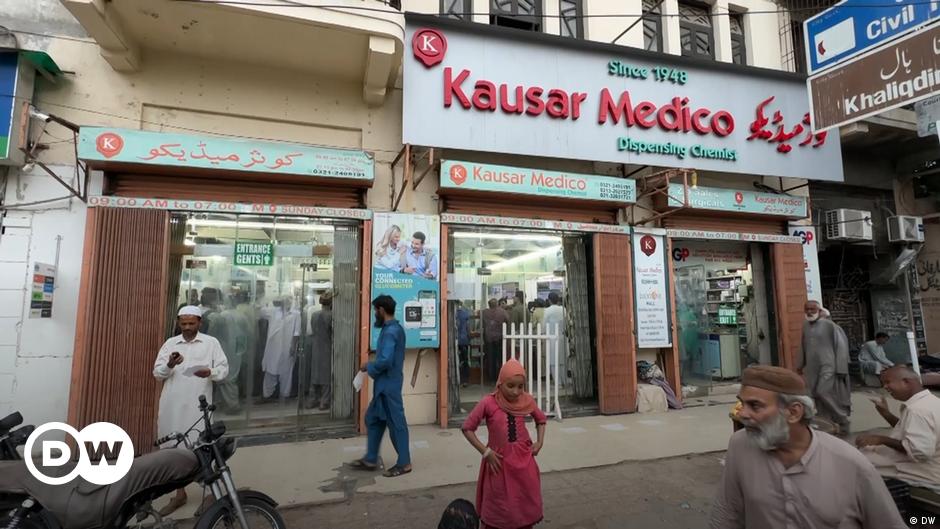Yasir Ali is a 35-year-old Pakistani day laborer who earns less than $4 (3.7) per day. His brother suffers from epilepsy and requires daily medication.
Speaking to DW, Yasir said the official price of a pack of epilepsy tablets is 300 Pakistani rupees (a little over a dollar), but he is forced to pay five times more on the black market due to a persistent shortage of medicines.
And he’s not the only one paying too much for his medications. Khalid Anjum, who has been selling pharmaceutical products wholesale for two decades, confirms that products now cost several times more than they did just a year ago.
He describes the prices as “totally unpredictable”.
“Now the shortage and disappearance of drugs poses a new challenge for us,” Khalid added.
The “drug mafia” is taking advantage of the shortage
One of the reasons for this crisis is persistent inflation. Pakistan is forced to import the majority of its medicines, or at least their active ingredients, from abroad, and with the fall in the value of the rupee, it is becoming increasingly difficult for Pakistani companies to purchase them. from foreign producers.
“We now find ourselves in a situation where several important drugs are becoming rare or unavailable in the Pakistani market,” Dr Faisal Sultan, a former aide to deposed Prime Minister Imran Khan, told DW.
Others also point to what Pakistanis call the “drug mafia,” unconscionable traders who stockpile drugs so they can sell them for a huge profit in times of shortage.
In 2023, drug regulatory officials raided several locations to uncover drug storage rooms in various parts of Pakistan.
Hospitals no longer have “life-saving” medications
But the latest blow to patients trying to obtain medicines came in April this year, when the Pakistani government approved a price increase of 14% for essential medicines and 20% for non-essential medicines. The decision, which came into force in September, directly affects more than 80,000 drugs.
The move was aimed at ensuring continued availability of medicines and raw materials for manufacturers in Pakistan.
The approval of a hike in drug prices is not unusual in itself over the past five years: the Pakistani government has given 15 such approvals. But such an increase, combined with import problems and drug stockpiling, appears to have had the opposite effect.
The latest decision caused the shortage and disappearance of more than 200 medicines, including vital and essential medicines, and seriously shook the general public.
Lawyer and activist Noor Mehr, who is also a member of the Drugs Lawyer Forum (DLF), says even hospitals are affected.
“A hundred life-saving medicines are not even available in hospitals for patients,” he said.
Peshawar’s black market booming
According to the Pakistan Pharmacists’ Association, this country of more than 240 million people has some 4,000 licensed pharmacies. At the same time, “another 100,000 illegal traders also sell drugs,” says the association.
Pharmaceutical trader Khalid Anjum says that in Peshawar, the capital of Khyber Pakhtunkhwa province, black market traders can supply their customers with any pharmaceutical product.
“The ordered medicines can be delivered to your doorstep within a week, and these are medicines that circulate especially in local medical stores and pharmacies in small towns without any prescription restrictions,” Khalid told DW.
Pakistan’s small pharmaceutical industry ‘no longer exists’
While the black market is booming, Pakistan’s domestic pharmaceutical industry is struggling.
Before the latest crisis, Pakistan had at least 600 registered production units in various parts of the country. However, domestic manufacturers remain heavily dependent on foreign suppliers. Pakistan imports 90% of the raw materials required for the production of medicines from different countries, including Germany, China and India.
Obaid Ali served as a federal regulator for over two decades in Pakistan and is currently engaged with the Center for Quality Sciences. Speaking to DW, Obaid confirms that “the government of Pakistan does not produce even a single standard medicine domestically.”
Medicines produced by local and international companies do not measure up to international pharmaceutical standards and cannot be exported to the outside world, he said.
In addition, the current economic crisis also jeopardizes the survival of these manufacturing units.
Around 200 small manufacturing plants have been completely shut down due to the ongoing inflation and financial crisis in Pakistan, Mansoor Qazi, former president of the Pakistan Pharmaceutical Manufacturing Association, told DW.
“The small-scale pharmaceutical industry no longer exists in Pakistan,” Qazi concluded.
Edited by: Darko Janjevic
#Pakistan #Soaring #drug #prices #leave #patients #struggling
Image Source : www.dw.com

